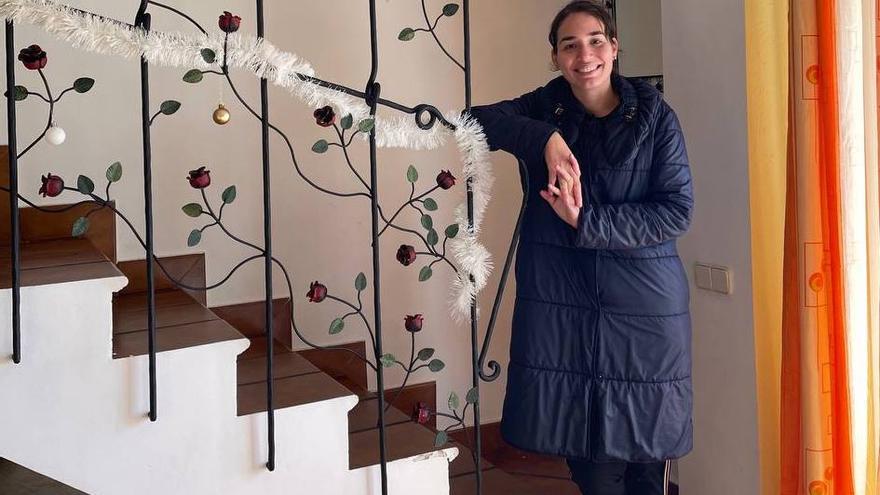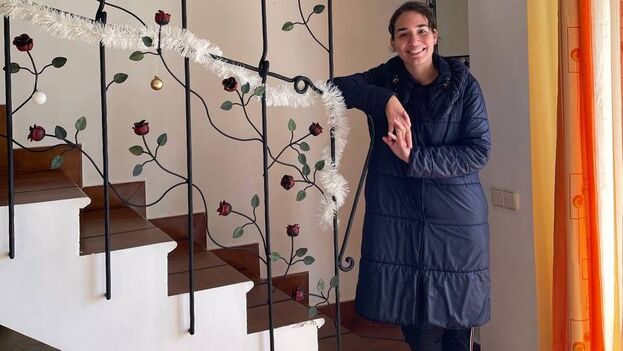
14ymedio, Yaiza Santos, Madrid, 24 December 2023 — Intending to violate the 7,500 kilometers of distance between Havana and Madrid, a message from State Security arrived last week for Amelia Calzadilla and her husband, Antonio Díaz. Both are regulated — the regime’s term of choice to mean ’forbidden to travel’ — and will not be able to return to Cuba. The communication did not arrive by regular mail or by e-mail, nor on letterhead, with an official seal and firm signature. It was a simple WhatsApp from Major Luis, the political police agent who attended to the couple until they left the Island, she with her three children last month, he in September.
Amelia tells 14ymedio almost at the end of a conversation that takes place between her house and a walk, in the quiet town on the outskirts of Madrid where the family now lives, and, for the first time, her eyes glaze over: “They know that it is a very harsh punishment, because I don’t have anyone in Spain, my whole family is in Cuba.” But she immediately recovers: “It’s hard, but nothing, it’s a punishment for telling the truth.”
For her, the decision of the political police was the direct result of the network broadcast she made on December 10, in which, once again, she expressed solidarity with other mothers on the Island who do not have a way to feed their children and denounced not only the economic management that has plunged the island into disaster but also the lies of the regime “that no one believes anymore.”
“They know that it is a very harsh punishment, because I don’t have anyone in Spain, my whole family is in Cuba”
“I was talking to the mothers, and to them that empathetic speech that we women manage to have, especially when we are mothers, that sensitivity that exists in the word when you are a mother and another mother understands you and you can put yourself in her place, it terrifies them, and then they take these types of measures,” she explains.
Serene and calm, Amelia Calzadilla differed greatly in that video from that other one, in June 2022, from her home in the municipality of Cerro, a video ignited with indignation and the hope of a new citizen protest in Cuba. Almost a year had passed since the massive demonstrations of 11 July 2021, and unease had settled on the Island after the repression and the open mass exodus via Nicaragua as an escape valve. And there was this mother of three small children, raised in the middle of the Special Period — after the collapse of the Soviet Union and the loss of its subsidies to Cuba — a woman who graduated in the English Language, beside herself, giving the highest government officials a shout-out for not delivering for the people they had so promised to serve.
She immediately became a target of State Security, which tried to discredit her through the official press. “In the space of 72 hours, with all the discredit campaign they created in my name, I was forced to do a second direct to vindicate my image, because what was happening didn’t make any sense.”
After that, she was summoned to the municipal government of Cerro by the authorities. When leaving the meeting, at that time, she said that they simply promised to solve her problems with the gas supply. Now, in this exile that they did not seek but that they are grateful for, both Amelia Calzadilla and Antonio Díaz, sitting in the dining room of their house, tell what really happened that day. “There they talked about everything except gas,” Antonio begins. “It was, by the book, an intelligence interrogation. There was a representative from the Ministry of Energy and Mines and all the others were military dressed as civilians.”
“They were not careful to show me that they were there, because they needed to intimidate me,” continues Amelia, who, as the daughter of a soldier, attended high school at an Army academy and “recognized the pattern.”
“It was, by the book, an intelligence interrogation. There was a representative from the Ministry of Energy and Mines and all the others were military dressed as civilians”
Before reaching the municipal government building, where they were surprised by the number of foreign journalists stationed in front, they already noticed something strange. In the populous neighborhood where they live, there was not a soul that morning. “They had a police force, the streets were closed,” says Antonio, who also remembers “a truck of special troops and a chain of police officers on the avenue.”
That “conversation” was, Antonio asserts, “to do a psychological profile.” As Cubans who have been subjected to harassment and repression within the Island know, those first approaches pass calmly, and with those mentioned they play at being good police officers. “What you are is confused,” Amelia repeats about what they told her. “Your problem is an ideological confusion, but obviously you are not against the Revolution.” It was, she repeats, “by the book”: “There is never a recognition of the problems that the country has, because it would be succumbing to the idea that socialism does not solve the social problems of a nation.”
As clear as the outlook was, Amelia, however, confesses that she was not prepared for the role that, unintentionally, she already played. “They automatically considered me as an opponent and I didn’t see myself that way, but as a person dissatisfied with the economic and social reality that the country was experiencing,” she says. “Also because of a maturity problem in terms of politics. Nobody starts out like I started, like that, sitting in front of the phone, screaming.”
That intimidation, whatever it was, achieved its objective, and Amelia did not broadcast again for several months. The following October, she was at it again, claiming that authorities were trying to falsely frame her for stealing some neighbors’ electricity. That reason was just the last straw. In the time that she was “silent,” there were what she calls “unfortunate actions,” which were “nothing in particular” but which “could not be coincidences.”
During the time she was “silent,” there were what she calls “unfortunate actions,” which were “nothing in particular” but which “could not be coincidences”
After the interrogation in Cerro’s government, the entire family fell ill with Covid-19. The couple is convinced that among those who attended the meeting, there were people with the virus there on purpose. As a result, Amelia developed pneumonia. Later, in a neighborhood where there were no cases of dengue, she and two children suffered from it. Amelia, with the hemorrhagic variant, which left her with an inflamed liver for half a year. “Every time there was a government visit, we got sick,” says Antonio. “And the last thing was the contamination of the cistern water,” continues Amelia, who saw how the children came down with gastroenteritis. “While I was recovering from hepatitis, the electric company workers came to the house to accuse me of stealing some neighbors’ electricity and I said: this is enough.”
In that direct message in which she resumed the complaints, she also said that they were trying to hinder her from traveling to the Spanish city of Salamanca, to pursue a master’s degree in translation for which she had obtained a scholarship. “That was one of the unfortunate events that I think they had something to do with,” Amelia narrates. She had been examined for those studies before taking any direct action.
A week after publishing her first video, the results were publi


